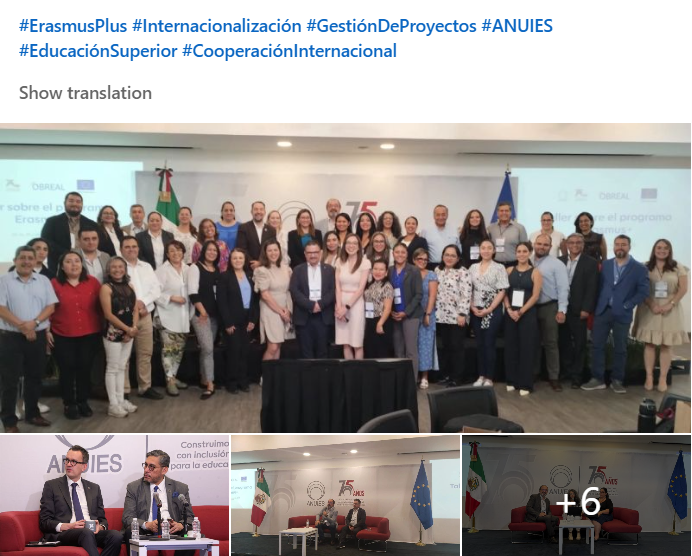From 13 to 16 May 2025, the Training Workshop on International Project Formulation and Management with a Focus on the Erasmus+ Programme was held at the Innovation and Development Centre of ANUIES in Mexico City. Jointly organized by ANUIES and OBREAL, the workshop convened 52 in-person participants from 37 higher education institutions and civil society organizations across Mexico, fostering an inclusive, diverse, and collaborative environment. Additionally, over 150 participants joined the event remotely via Zoom and YouTube, further expanding its reach.
The main objective of the workshop was to strengthen the institutional capacities of Mexican Higher Education Institutions (HEIs) in the design and management of international cooperation projects, particularly those funded by the Erasmus+ Programme. It also aimed to promote greater participation of Mexican HEIs in international networks and improve their access to global funding mechanisms, thereby enhancing their international visibility, strategic positioning, and competitiveness.
The opening session was followed by two hybrid-format academic panels. The first, titled "Opportunities for International Cooperation through Erasmus+ Programmes," featured:
- Daniel Ventura Cáceres, Regional Project Manager for Latin America and the Caribbean, Support to the Network of Erasmus+ National Focal Points (ENFPs)
- Kevin O'Connell, Head of the Political, Press, and Information Section, Delegation of the European Union to Mexico
- Cristina Martínez Castellanos, Education and Culture Officer, Delegation of the European Union to Mexico
This session offered an overview of the international cooperation opportunities available to Mexican universities through the Erasmus+ Programme and other European Union initiatives. Discussions focused on the programme’s scope, objectives, priority areas, and its relevance for academic development and student training in a global context. The role of the EU Delegation in Mexico in fostering cooperation in education and culture was also emphasized.
The second panel, titled "Capacity-Building Projects as Part of the Internationalization Strategy," featured:
- María Giovanna Cordero, Administrative Assistant of the Directorate of International Cooperation of the Ministry of Foreign Affairs of Panama, and Erasmus+ National Focal Point of Panama
- Alejandro Quinteros Álvarez, Representative of the Uruguayan Agency for International Cooperation, and Erasmus+ National Focal Point of Uruguay
- Luisa Fernanda Villamizar, Deputy Director for International Relations, Colombian Association of Universities (ASCUN)
Panelists shared practical experiences from Erasmus+ project implementation in their respective countries, highlighting key lessons learned, such as:
- The value of South-South cooperation in expanding participation
- The importance of building stable and trust-based partnerships
- Institutional learning through early-stage challenges or proposal rejections
- The strategic role of national networks like ASCUN in Colombia
Following the panel discussions, remote participants were thanked and dismissed, and the core workshop activities officially commenced.
Over the next four days, participants engaged in intensive training sessions led by Jaume Fortuny Lahoz and Ángel Manuel Rafael Poyo, Senior Project Managers at OBREAL. The sessions were dynamic, integrating theoretical frameworks with practical exercises. Participants worked in multidisciplinary teams, applying project management tools and methodologies, and developing competencies in proposal writing, project implementation, and the cultivation of international partnerships.
After each activity, selected teams presented their work and received structured feedback from facilitators. The workshop design ensured that every team had at least one opportunity to share its progress and benefit from expert and peer evaluation.
Key learning outcomes identified by participants included:
- A stronger understanding of the Erasmus+ Programme structure and platform
- Practical skills applicable to future funding applications
- Greater awareness of the importance of building strategic and sustainable international partnerships
In the final session, participants expressed keen interest in replicating this type of capacity-building initiative in areas such as research, social development, and the design of institutional internationalisation strategies.
The Erasmus+ Workshop proved to be a valuable platform for strengthening the internationalisation agenda of Mexican higher education. The collaboration between ANUIES and OBREAL resulted in a high-impact training experience that supports the effective engagement of Mexican HEIs in global academic cooperation. This joint initiative reaffirms a shared commitment to building a more inclusive, interconnected, and competitive higher education space across Latin America and Europe.
Did you find this article interesting? Would you like to learn more about Erasmus+ programs and scholarships for you and your institution in your country? Feel free to contact your Erasmus+ National Focal Point (ENFP)!
ENFP of Mexico- César Eduardo Gutiérrez (ANUIES): cesar.gutierrez@anuies.mx
Auxiliar ENFP of Mexico: Brenda Galaviz (ANUIES): brenda.galaviz@anuies.mx



Please log in or sign up to comment.